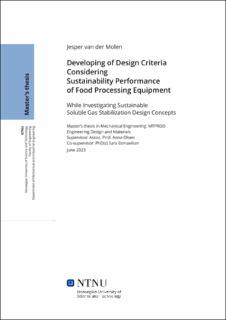| dc.contributor.advisor | Olsen, Anna | |
| dc.contributor.advisor | Esmaeilian, Sara | |
| dc.contributor.author | van der Molen, Jesper | |
| dc.date.accessioned | 2023-10-03T17:21:59Z | |
| dc.date.available | 2023-10-03T17:21:59Z | |
| dc.date.issued | 2023 | |
| dc.identifier | no.ntnu:inspera:146039120:35017391 | |
| dc.identifier.uri | https://hdl.handle.net/11250/3093903 | |
| dc.description.abstract | Denne masteroppgaven fokuserer på implementeringen av bærekraftsmål
i designfasen av oppskaleringen av industrielle matbehandlingsteknologier. Målet
er å utvikle retningslinjer for integrering av bærekræftprinsipper ved hjelp av et
SDAG-verktøy, som er et verktøy basert på FNs bærekraftsmål, og i denne opp-
gaven også inspirert av bærekraftsorientert innovasjon, produktutviklingsmetoden
Design for Miljø og bærekraftig design. Forskningen involverer vurdering av bran-
sjens nåværende bærekraftsytelse og samarbeider med sentrale interessenter, særlig
en prosesseringsutstyrsleverandør, for å etablere primære og sekundære designkri-
terier. Ved hjelp av en systemteknisk tilnærming utforsker oppgaven opti-
maliseringen av innløps- og utløpskonfigurasjoner for bærekraftig konseptutvikling
av den nye teknologien Soluble Gas Stabilization (SGS) (løselig gasstabilisering).
Et omfattende sett med designspesifikasjoner, basert på resultatene fra SDAG-
verktøyet, men også andre relevante krav, veileder evalueringen og optimalis-
eringen av de alternative designløsningene som utvikles i konseptutviklingsfasen.
Bærekraftseffekten av de endelige alternativene kan så vurderes videre ut fra bran-
sjens bærekraftsytelse og det endelige, omfattende designspesifikasjonssettet.
Funnene fremhever forbedringsområder i implementering av bærekraft
innen matbehandlingsindustrien og introduserer bærekraftige designkriterier i pro-
duktutviklingsprosessen for SGS-prosessutstyr. Forskningen understreker den øk-
ende betydningen og prioritering av bærekraft i matprosesseringsindustrien, men
det gjenstår utfordringer med å integrere bærekraft i designfasen av nyutviklede
produkter, da det fremdeles er et høyere fokus på kontinuitet, effektivitet og
økonomi, spesielt når det kommer til oppskalering av industriell produksjon.
Masteroppgaven håper å gi svar på hvordan ulike bærekraftsprinsipper
blir prioritert i industrien, og hvordan så bærekraft kan bli integrert i designfasen
av nyutviklede produkter. Spesielt interessant er det å se på bærekraft i norsk lak-
seindustri med tanke på den norske stats innføring av lakseskatt, og generelle andre
begrensninger og utfordringer i blant annet manglende interessentunvolvering og
generelle vanskeligheter ved oppnåelse av bærekraftsmål. Funnene fra oppgaven
kommer mest sannsynlig til å kunne brukes som anbefalinger for interessenter til
å oppdage og forbedre bærekraftytelser i både næværende og fremtidig prosesser-
ingsutstyr, og kan muligens også overføres til andre industrier. | |
| dc.description.abstract | This master thesis focuses on the implementation of sustainability objec-
tives in the design phase of industrial up-scaling for food processing technologies.
The study aims to develop guidelines for integrating sustainability principles us-
ing an SDAG tool, based on the UNs SDGs, and in this study also inspired by
sustainability-oriented innovation, design for environment, and sustainability by
design. The research involves assessing the sustainability performance of the in-
dustry and collaboratively establishing primary and secondary design criteria with
key stakeholders, particularly an FPE manufacturer. Using a systems engineering approach, the thesis investigates the optimization of inlet and outlet configurations for sustainable concept development
of the Soluble Gas Stabilization (SGS) technology. A comprehensive set of design
specifications, based on the results from the SDAG tool and other relevant require-
ments, guides the evaluation and optimization of alternative design solutions in
the concept development phase. The sustainability impact of the final alternatives
can then be assessed based on the industry’s sustainability performance and the
comprehensive set of design specifications.The findings highlight areas for improvement in the implementation of sustainability in the food processing industry and the introduction of sustainable
design criteria in the product development process for SGS process equipment.
The research emphasizes the increasing importance and prioritization of sustain-
ability in the food processing industry, but challenges remain in integrating sus-
tainability in the design phase of newly developed products, especially in terms of
continuity, efficiency, and cost considerations related to industrial up-scaling.
Through the master’s thesis, there is target in addressing questions re-
garding how different sustainability principles are prioritized in the industry and
how sustainability can be integrated into the design phase of newly developed
products. Of particular interest is the examination of sustainability in the Nor-
wegian salmon industry, considering the Norwegian government’s introduction of
salmon taxes and other constraints and challenges related to stakeholder involve-
ment and achieving sustainability goals. The findings from the thesis can provide
valuable recommendations for stakeholders to identify and improve sustainability
performance in current and future processing equipment. Possibly, the findings
are also transferable to other industries. | |
| dc.language | eng | |
| dc.publisher | NTNU | |
| dc.title | Developing of Design Criteria Considering Sustainability Performance of Food Processing Equipment - While Investigating Sustainable Soluble Gas Stabilization Design Concepts | |
| dc.type | Master thesis | |
